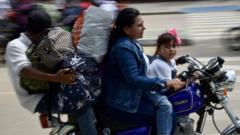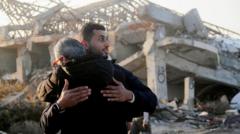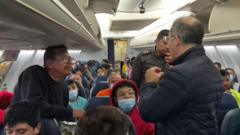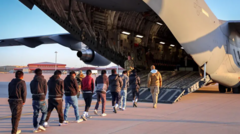The recent spike in violence in Colombia’s Catatumbo region has left 60 people dead as rival factions battle for control of the drug trade, prompting fears of a humanitarian crisis.
Colombian Gang Violence Escalates: 60 Lives Lost in Catatumbo Region

Colombian Gang Violence Escalates: 60 Lives Lost in Catatumbo Region
Violence from rival drug factions leads to severe humanitarian crisis in Colombia.
The death toll from violent clashes in Colombia's Catatumbo region has reached 60, according to the country's human rights office. The escalating violence has been attributed to a turf war between the National Liberation Army (ELN)—Colombia's largest active armed group—and the Revolutionary Armed Forces of Colombia (FARC), the latter having signed a peace agreement with the government in 2016. The Ombudsman's Office confirmed that this latest outbreak of violence has shattered a fragile truce that had been in place during ongoing peace talks.
This alarming conflict, which is intensifying due to struggles for drug control in the border area with Venezuela, has displaced thousands, creating additional strain on local communities. Recent reports indicate that among the deceased are seven signatories of the peace agreement, including Carmelo Guerrero, leader of the Association for Peasant Unity in Catatumbo (ASUCAT). Guerrero's organization has expressed deep concern for the safety of its members, citing the recent disappearance of board members Roger Quintero and Freiman Velasquez amidst fears they may have been abducted.
In a grim development, the violence is beginning to impact community sustenance, with food shortages emerging in various areas. The Ombudsman's Office emphasized the plight of vulnerable groups, including children and the elderly, affected by the turmoil. Grassroots organizations are warning that the ramifications of the conflict extend beyond mere fatalities; they include emotional trauma and the fragmentation of family units.
Statements from the Ombudsman's Office have placed a significant portion of the blame on the ELN, which had been negotiating with the Colombian government. President Gustavo Petro, seeking a cessation of violence, condemned the ELN for alleged "war crimes" and for showing little desire for peace. In response, the ELN accused FARC of instigating violence by targeting civilians, a claim FARC has yet to address publicly.
In a bid to restore order, the Colombian Army has announced the deployment of additional troops to the beleaguered region, highlighting the urgency of the situation amid the ongoing conflict.
With the political landscape in Colombia constantly shifting, the affected communities remain hopeful for a timely resolution, as international attention on the humanitarian crisis continues to grow.
This alarming conflict, which is intensifying due to struggles for drug control in the border area with Venezuela, has displaced thousands, creating additional strain on local communities. Recent reports indicate that among the deceased are seven signatories of the peace agreement, including Carmelo Guerrero, leader of the Association for Peasant Unity in Catatumbo (ASUCAT). Guerrero's organization has expressed deep concern for the safety of its members, citing the recent disappearance of board members Roger Quintero and Freiman Velasquez amidst fears they may have been abducted.
In a grim development, the violence is beginning to impact community sustenance, with food shortages emerging in various areas. The Ombudsman's Office emphasized the plight of vulnerable groups, including children and the elderly, affected by the turmoil. Grassroots organizations are warning that the ramifications of the conflict extend beyond mere fatalities; they include emotional trauma and the fragmentation of family units.
Statements from the Ombudsman's Office have placed a significant portion of the blame on the ELN, which had been negotiating with the Colombian government. President Gustavo Petro, seeking a cessation of violence, condemned the ELN for alleged "war crimes" and for showing little desire for peace. In response, the ELN accused FARC of instigating violence by targeting civilians, a claim FARC has yet to address publicly.
In a bid to restore order, the Colombian Army has announced the deployment of additional troops to the beleaguered region, highlighting the urgency of the situation amid the ongoing conflict.
With the political landscape in Colombia constantly shifting, the affected communities remain hopeful for a timely resolution, as international attention on the humanitarian crisis continues to grow.





















